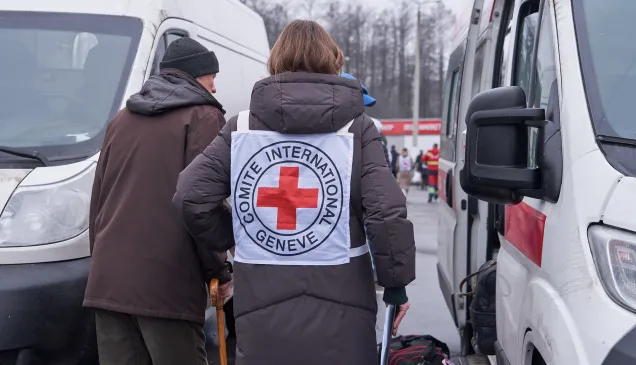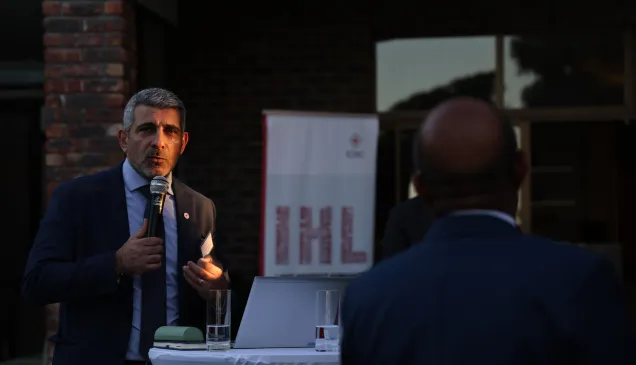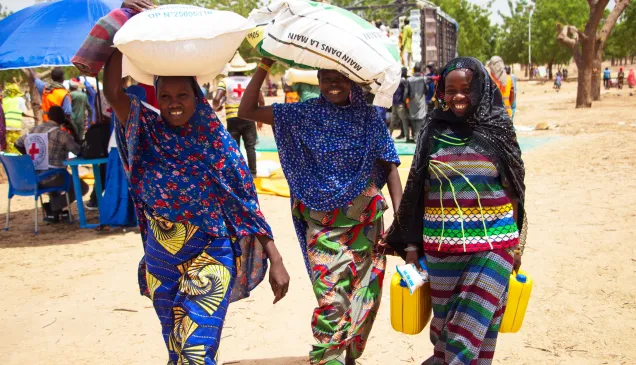The ICRC and the German Permanent Mission to the United Nations hosted a panel discussion at the ICRC's Humanitarium in Geneva on 29 June 2017 to launch Humanizing the Laws of War: The Red Cross and the Development of International Humanitarian Law, a book edited by Robin Geiß, Andreas Zimmermann and Stefanie Haumer (Cambridge University Press, 2017).
Opening remarks
• Dr. Ulrich Seidenberger, Ambassador, Permanent Mission of Germany to the UN in Geneva
Introductory remarks and moderation
• Andreas Zimmermann, Professor of International and European Law at the University of Potsdam and Director of the Potsdam Centre of Human Rights
Panelists
• Robin Geiß, Professor of International Law and Security, University of Glasgow
• Carsten Staur, Ambassador, Permanent Mission of Denmark to the UN in Geneva
• Dr. Heike Spieker, Deputy Director of the International Services & National Relief Division, German Red Cross
• Dr. Jean-Marie Henckaerts, Head of the ICRC project to update the Commentaries on the Geneva Conventions of 1949 and their Additional Protocols of 1977
The panel discussed the impact of the International Red Cross and Red Crescent Movement (Movement) on the development, consolidation and codification of international humanitarian law (IHL). The event was part of the ICRC's conference cycle on generating respect for the law, which seeks to engage with academic and other partners in order to improve compliance with the law.
In his opening remarks, Ambassador Dr Ulrich Seidenberger (Permanent Mission of Germany to the United Nations) deplored the increasing disrespect for international humanitarian law, as illustrated recently by targeted attacks against medical units in armed conflicts, and welcomed reflection on the underlying causes and possible remedies for non-compliance.
Professor Andreas Zimmermann (University of Potsdam) opened the discussion about the Movement's, and in particular the ICRC's, contribution to the development of IHL. He presented the book, which is the result of a conference co-organized by the University of Potsdam and the German Red Cross in Berlin in 2013 on the occasion of the 150th anniversary of the Movement. The issues covered in the book and the panel discussion included where the Red Cross has been able to play a decisive and accepted role in developing IHL, where States have claimed or reclaimed a more exclusive role in setting standards, and what role the Red Cross could play in the future.
Professor Robin Geiß (University of Glasgow) initially observed how unusual it was that a non-State actor such as the ICRC had had such influence on the normative development of a branch of international law so focussed on security and military interests. He then discussed some factors explaining the ICRC's unique success in shaping IHL, which primarily comprised the universally accepted importance, ubiquity and persuasiveness of its humanitarian mission, from which its legal mandate is derived, as well as its operational and moral credibility based on the Movement's Fundamental Principles, such as impartiality and neutrality. The ICRC's unique global structure and versatile modes of operation had enabled it to engage relevant actors in a broad range of conversations – from confidential bilateral dialogue to public multilateral initiatives – based on authentic, first-hand operational experience. Although appropriate resources had afforded the ICRC the patience necessary to overcome regular and ordinary setbacks, the declining universal appeal of IHL and of the ICRC's humanitarian mission, as well as a tendency to over-regulate IHL, risked challenging the ICRC's future role.
Dr Jean-Marie Henckaerts (ICRC) recalled the ICRC's mandate with respect to IHL under the Geneva Conventions, Additional Protocols, Statutes of the Movement and Statutes of the ICRC. He summarized past and recent initiatives to develop and clarify IHL and acknowledged both successes (e.g. the ICRC's contribution to the codification of the Additional Protocols) and shortcomings (e.g. the Tokyo and Delhi drafts). In conclusion, he noted the currently limited availability of States for comprehensive State-led processes beyond monothematic initiatives and highlighted the continued existence of "space" for humanitarian non-State actors like the ICRC to take responsibility for such processes.
Dr Heike Spieker (German Red Cross) broadened the view on the Red Cross as a "gentle modernizer of IHL" by examining the National Red Cross and Red Crescent Societies' "equally unique but different" mandate with respect to IHL, which comprised (1) the dissemination of IHL, (2) assistance to governments in disseminating IHL and (3) cooperation with governments in ensuring respect for IHL. By way of example, she described National Societies' contributions to national IHL committees and to the International Conference of the Red Cross and Red Crescent, in particular their endeavours to provide meaningful and responsible input as part of efforts to strengthen compliance with IHL following the recent decisions of the International Conference.
Ambassador Carsten Staur (Permanent Mission of Denmark to the United Nations, Chair of the Drafting Committee of the 32nd International Conference) affirmed that, while compliance with IHL remained the core issue, initiatives to strengthen institutional support would likely be contested for "at least the coming decade". Only limited progress had been made since the 32nd International Conference, which he considered to have fallen short due to "misjudgement of the political climate". He consequently stressed the importance of States adhering to IHL, regardless of the possible disrespect by others, and of States developing relevant and practical domestic guidance, such as in national military manuals.
The event closed with a broader discussion of the perceived added value of existing and potentially future international humanitarian law, and the role that actors such as the Movement could play in and beyond treaty codification.




